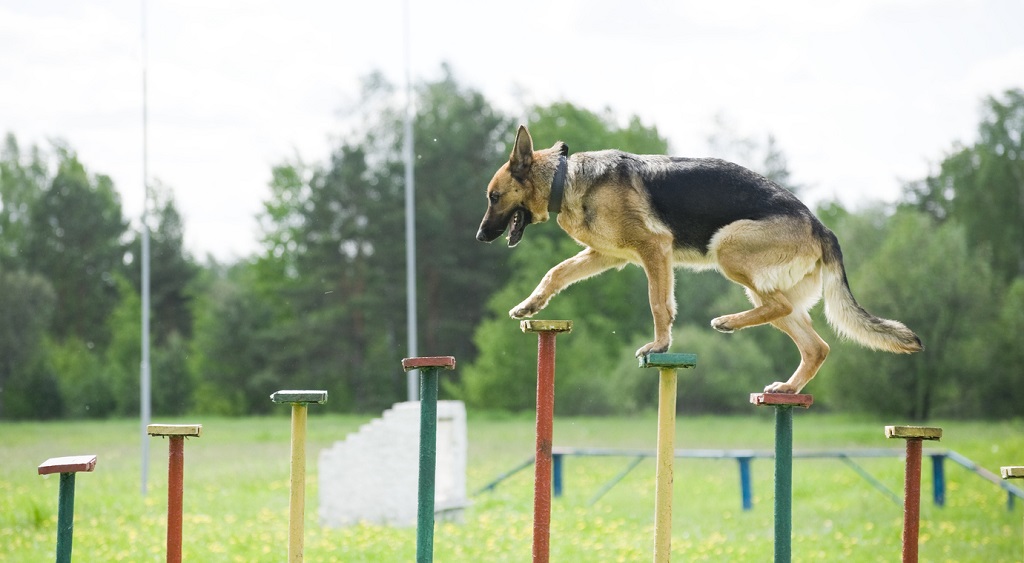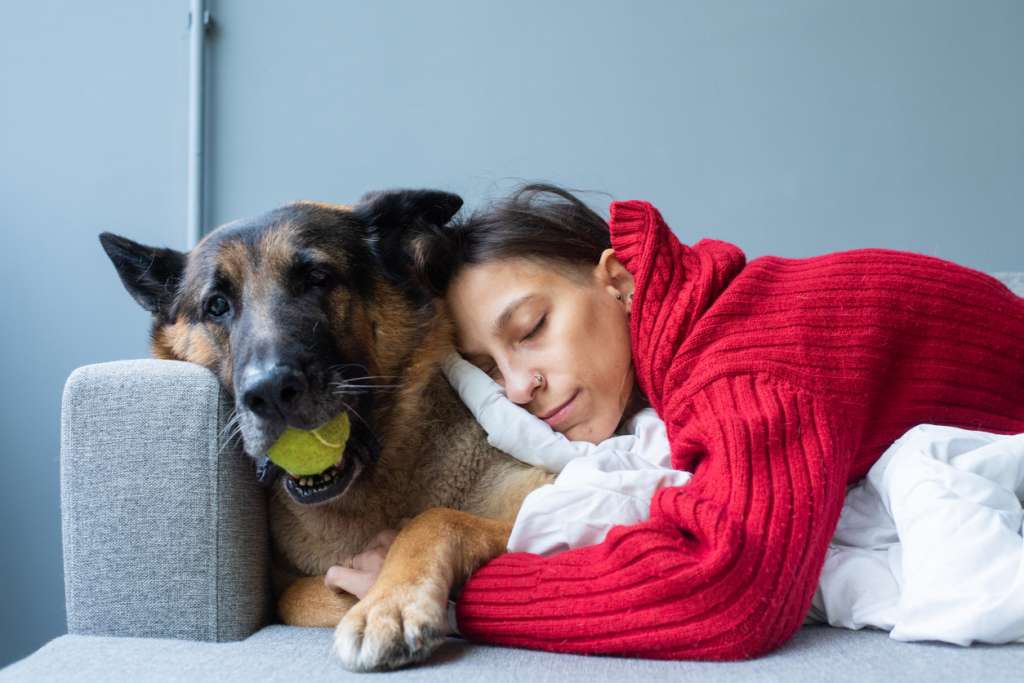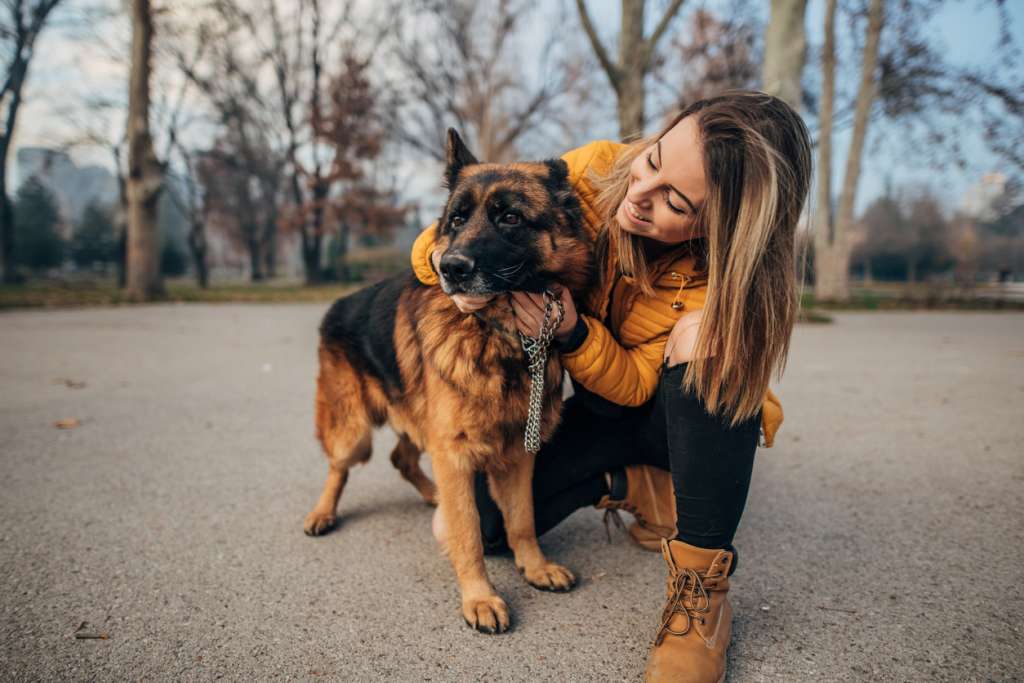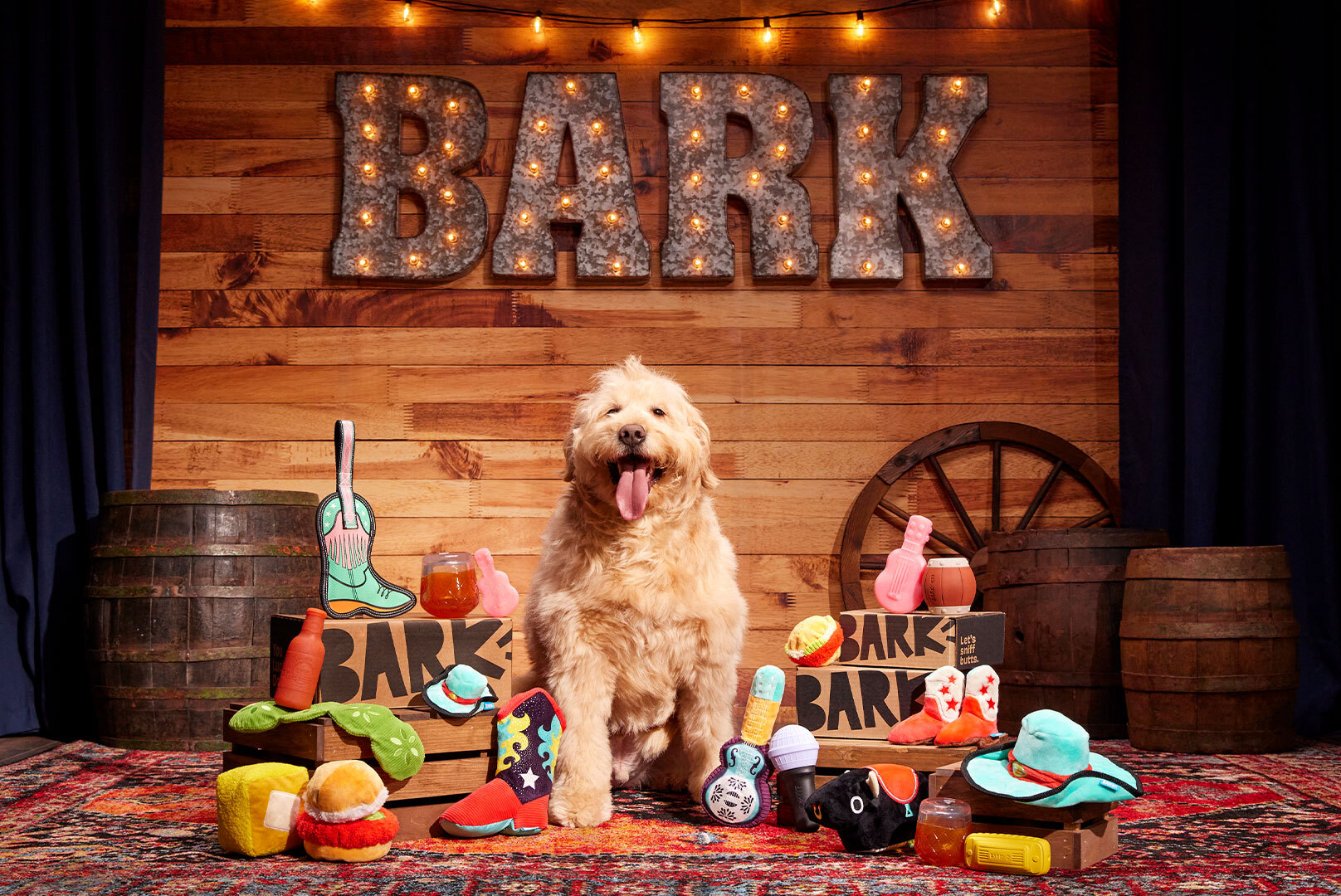For Pups With Short Attention Spans…
German Shepherds are prone to a number of health issues that potential owners should be aware of. Some health conditions include, hip and elbow dysplasia, bloat, degenerative myelopathy, eyesight issues, and cancer.
Intelligent, noble, and naturally protective, German shepherds guard our homes—and our hearts.
These gentle beasts are often bred for agility and herding. However, the very characteristics that make them so dexterous, like their sloped backs and deep chests, may also lead to breed-specific health problems that can hinder a German shepherd dog’s ability to move.
To ensure your furry protector remains healthy and happy, we’re shepherding you through the 6 most common German shepherd health issues.
#1 Hip Dysplasia
Some German shepherds are born with hip dysplasia, a genetic condition that develops due to a mismatched ball and socket joint in the hips. These two bones grind and grate together—think something like a mortar and pestle—causing inflammation and pain to the hip joints.
You may begin to see your GSD bunny hopping or limping due to stiffness in their hind leg. Your active pup may even begin to resist going for walks to their favorite park or roughhousing with their other furry friends.
Treatment
Unfortunately, there is no way to cure hip dysplasia. However, proper treatment can ease your pup’s pain and allow them to live a normal life. Treatments for hip dysplasia can include:
- Weight reduction to relieve stress on the hips
- Low to moderate exercise
- Joint supplements like glucosamine, chondroitin, sulfate, and omega-3 fatty acid
- Anti-inflammatory medications
- Hip replacement surgery
- Physical therapy


#2 Elbow Dysplasia
There’s nothing humerus about elbow dysplasia. In fact, it can cause a rather large amount of pain and discomfort to your pup. The German Shepherd breed and other large breeds have genetic predispositions towards this condition. This inherited condition occurs when the elbow joint develops abnormally during a German shepherd puppy growth spurt, causing the bones and cartilage in the joints to rub together.
German shepherd dog with this condition may have difficulty performing physical activity due to their swollen and painful joints, like:
- Running
- Walking
- Jumping
Treatment
Treatment options for elbow dysplasia are identical to those for hip dysplasia—give your growing pup plenty of exercise and joint supplements and consider veterinarian intervention.
#3 Bloating
Due to GSDs’ large size and deep chest, they are at high risk for gastric dilatation and volvulus or bloating of their gastric system.
We’ve all had the urge to inhale our food—well, so do dogs. When your GSD eats too quickly, they can inhale a large amount of air that may cause their stomach to twist and expand. This condition is very serious and can quickly become fatal if you don’t get medical attention.
Your companion may attempt to tell you something is wrong by vomiting or drooling excessively. You may also notice their stomachs start to swell. If you see any of these symptoms, it’s important to get your furry friend to the vet as quickly as possible.
Treatment and Prevention
If your GSD has gastric dilation or volvulus, they will most likely need to visit a vet, and receive fluids, medicine, and regular exercise to dispel the gas.
To prevent bloating, you may need to feed your GSD small meals throughout the day and avoid strenuous exercise immediately after eating. You can also buy special bowls that make your working dog slow down as they eat.
#4 Degenerative Myelopathy
Degenerative myelopathy is a type of degenerative spinal disorder that affects the nerves in your German shepherd’s lower spine. This disorder is quite severe and will eventually progress to complete paralysis of the:
- Bladder
- Bowels
- Limbs
German shepherds with this condition typically start showing signs around 8 to 9 years old with the weakening of one or both hind limbs. Over weeks or months, this progressive degenerative disorder will spread to the front limbs.
Treatment
There is currently no cure for degenerative myelopathy. Physical therapy has been shown to delay the degeneration of the limbs but will not stop the progression completely.


#5 Diminished Sight
German shepherds are also susceptible to eye problems. Pannus is a genetic condition that affects the cornea of the eye. GSDs with this condition will develop a cloudy, pink mass that covers and scars the eye.
Pannus typically occurs in older German Shepherds, and if left untreated, your GSD may experience blindness.
Treatment
Similar to other genetic disorders, treatment of pannus will only stall its progression and will not offer a permanent cure. Topical corticosteroids and antibiotics may be used to treat the health condition directly.
Doggy sunglasses are also recommended to protect your pup’s eyes from damaging UV light.
#6 Cancer
Cancer is most commonly found in older German shepherds. The most common types of cancer include:1
- Osteosarcoma – This is a type of bone cancer that produces aggressive tumors that progressively damage the bones of the limbs, skull, vertebrae, ribs, vertebrae, and pelvis.2 Signs can include swelling, lameness, weight loss, and loss of appetite.
- Hemangiocarcinoma – GSDs are genetically predisposed to hemangiocarcinoma. This cancer develops in the blood vessels of GSDs and can target the heart, liver, spleen, and skin.3 Symptoms include pale gums, lethargy, distended abdomen, and decreased appetite.
- Lymphoma – This cancer goes after the entire immune system of GSDs. Though aggressive, this cancer is not particularly painful to your pup.4 Signs of lymphoma include thirstiness, increased urination, vomiting, and diarrhea.
- Skin Tumors – Cancerous skin tumors can be found on your GSD. These growths will often feel lumpy or hard to the touch. If the tumor is malignant, your dog may also experience abnormal discharge, panting, or loss of appetite.


Why Do German Shepherds Breed Bad Joints?
According to a study from the Royal Veterinary College, German Shepherds are the second most common dog breed to experience pet health disorders as a direct result of their breeding traits.5
But why exactly are German Shepherds destined for a life of awkward bunny hops and painful shuffles?
It all comes down to their unique disposition—selective breeding favors German shepherds with low hindquarters and sloping backs.6 While these traits certainly give German shepherds a sleek (dare we say, daunting) look, they may also predispose GSDs to musculoskeletal and joint disorders, as their low backs can impede the movement of their back legs.6
Breed Watch, which aims to identify points of concern for various dog breeds, also raises concerns about excessive angulation of the back knee and leg joints, weak hindquarters, and an uneasy temperament, which are commonly found among German shepherds.6
As a result, a lack of movement can further hinder your German shepherd’s health, leading to such conditions as:
- Obesity
- Osteoarthritis
- Aggression
- Tiredness
How to Boost Your Pup’s Joint Health
Due to joint and bone pain, your swift German shepherd can slow down as they age, and friction from everyday movement can hinder your GSD’s ability to hop, flop, and ka-plop easily.
Fortunately, you can keep your rambunctious forever-pup on the move with a few preventative measures, including:
- Lubricating supplements – From puppyhood, you can support your German shepherd’s bone and joint health with breed-specific dog food that’s packed with glucosamine, omega 3s, and chondroitin. While glucosamine and omega 3s can protect, cushion, and lubricate your GSD’s joints, chondroitin works to prevent and repair joint tissue damage.7
Shop our expertly formulated german shepherd food and get 25% off with code 25FOOD, plus free shipping!
- Regular play – To prevent feelings of stiffness or soreness, take your GSD out on regular jaunts around the neighborhood or to the park. Consistent low-intensity exercise can help naturally lubricate your friend’s joints and bones, allowing them to leap across fallen logs and chase unsuspecting squirrels with ease.
- Doggy spa days – Even your pooch needs some pampering, too. After a long day, light a candle, play some relaxing birdsong and give your dog a well-deserved massage. Start with long strokes. Once you’ve pinpointed a pain spot, use smaller movements to ease any aches and pains. However, be wary of any yelps or attempts to flee—you’ve probably hit an uncomfortable spot that your dog would rather you avoid.
- Weight Watchers for pups – Okay, so there won’t be any roundtable meetings, but regular weigh-ins can help keep your pup’s weight down to reduce its impact on your German shepherds’ hips, joints, and bones. It’s critical to keep your GSD swift and slim with a healthy diet and regular exercise—especially in older dogs.
That said, if your dog is experiencing difficulties getting up, limping, or listlessness, it’s advised to consult with your veterinarian to identify a health plan that suits your sweet shepherd.
Herd Your German Shepherd Toward Good Health With BARK Post


Due to many German shepherds’ breeding, they may be more prone to health issues related to poor joint health and bloating, as well as common cancers and eye issues. As such, it’s critical to support your pup’s lifestyle with regular exercise and weight management, as well as glucosamine and omega supplements.
While there are a variety of reputable options for dog food that can help support your German shepherd’s health, BARK Post provides a bevy of healthy, dog breed-specific chow that is just as beneficial as it is tasty.
Our farm-raised, nutritionists-formulated Cock-a-Doodle-Chew recipe contains glucosamine to support healthy joints and bones, and our bacon-flavored Hip Hop Hooray supplements will have your German shepherd jumping for joy (and treats!) thanks to its collagen peptide- and glucosamine-packed formula.
And it’s delivered right to your door—after a few territorial barks, we’re sure your German shepherd will welcome BARK Post food in with open paws.
For more German Shepherd resources like 10 German Shepherd Fun Facts and Do German Shepherds Shed?, visit our blog for more helpful tips and information.
Sources:
- WPSGSS. Cancer and Your Older German Shepherd. https://www.wpsgss.org/post/cancer-and-your-senior-german-shepherd-the-older-he-gets-the-greater-the-risk
- Flint Animal Cancer Center. Bone Cancer in Dogs. https://www.csuanimalcancercenter.org/2020/07/09/bone-cancer-in-dogs
- PetMD. Hemangiosarcoma in Dogs. https://www.petmd.com/dog/conditions/cancer/hemangiosarcoma-dogs
- Blue Pearl. Canine Lymphoma. https://bluepearlvet.com/medical-articles-for-pet-owners/canine-lymphoma/
- Earth. German Shepherd study reveals health consequences of breeding. https://www.earth.com/news/german-shepherd-health-breeding/
- Huffington Post. German Shepherds Are Dying Of Painful Conditions Caused By Selective Breeding. https://www.huffingtonpost.co.uk/entry/german-shepherds-are-dying-of-painful-conditions-caused-by-selective-breeding_uk_597b0869e4b02a8434b5b1b9
- Nutra Ingredients. Science: The benefits of glucosamine and omega-3. https://www.nutraingredients.com/Article/2010/04/19/Science-The-benefits-of-glucosamine-and-omega-3





